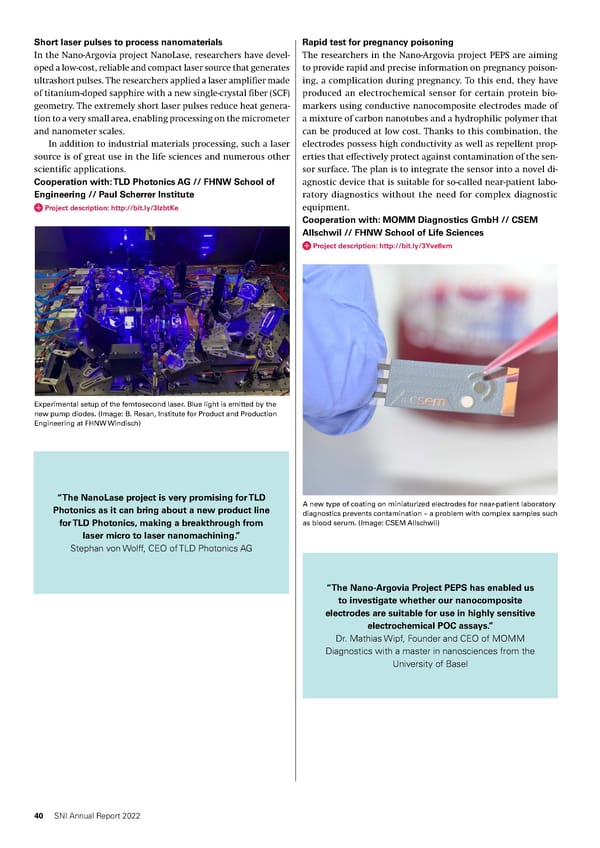Short laser pulses to process nanomaterials Rapid test for pregnancy poisoning In the Nano-Argovia project NanoLase, researchers have devel- The researchers in the Nano-Argovia project PEPS are aiming oped a low-cost, reliable and compact laser source that generates to provide rapid and precise information on pregnancy poison- ultrashort pulses. The researchers applied a laser amplifier made ing, a complication during pregnancy. To this end, they have of titanium-doped sapphire with a new single-crystal fiber (SCF) produced an electrochemical sensor for certain protein bio- geometry. The extremely short laser pulses reduce heat genera- markers using conductive nanocomposite electrodes made of tion to a very small area, enabling processing on the micrometer a mixture of carbon nanotubes and a hydrophilic polymer that and nanometer scales. can be produced at low cost. Thanks to this combination, the In addition to industrial materials processing, such a laser electrodes possess high conductivity as well as repellent prop- source is of great use in the life sciences and numerous other erties that effectively protect against contamination of the sen- scientific applications. sor surface. The plan is to integrate the sensor into a novel di- Cooperation with: TLD Photonics AG // FHNW School of agnostic device that is suitable for so-called near-patient labo- Engineering // Paul Scherrer Institute ratory diagnostics without the need for complex diagnostic Project description: http://bit.ly/3lzbtKe equipment. Cooperation with: MOMM Diagnostics GmbH // CSEM Allschwil // FHNW School of Life Sciences Project description: http://bit.ly/3Yve6vm Experimental setup of the femtosecond laser. Blue light is emitted by the new pump diodes. (Image: B. Resan, Institute for Product and Production Engineering at FHNW Windisch) “The NanoLase project is very promising for TLD A new type of coating on miniaturized electrodes for near-patient laboratory Photonics as it can bring about a new product line diagnostics prevents contamination – a problem with complex samples such for TLD Photonics, making a breakthrough from as blood serum. (Image: CSEM Allschwil) laser micro to laser nanomachining.” Stephan von Wolff, CEO of TLD Photonics AG “The Nano-Argovia Project PEPS has enabled us to investigate whether our nanocomposite electrodes are suitable for use in highly sensitive electrochemical POC assays.” Dr. Mathias Wipf, Founder and CEO of MOMM Diagnostics with a master in nanosciences from the University of Basel 40 SNI Annual Report 2022
 SNI Annual Report 2022 Page 39 Page 41
SNI Annual Report 2022 Page 39 Page 41